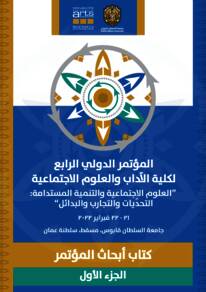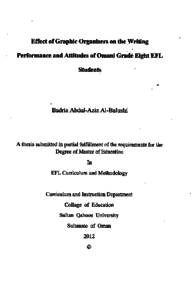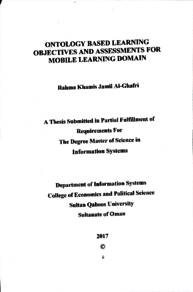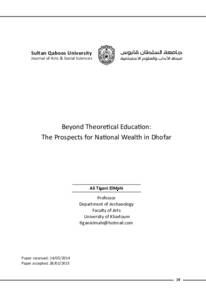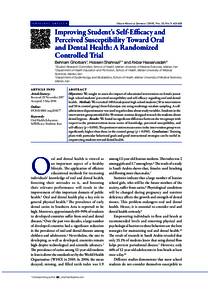Document
Online education and anxiety among university students during the COVID-19 pandemic.
Publisher
Sultan Qaboos University
Gregorian
2022
Language
English
Subject
English abstract
Aim: The study examined the effects of emergency online education on the
mental wellbeing of university students during COVID-19 pandemic.
Subject and Method: The fast spread of COVID-19 forced universities to shift
from conventional pedagogy to online education. Many students, however,
encountered mental challenges during this transition. To examine anxiety
caused by the pandemic and the lockdown policies, a questionnaire was
developed and evaluated by five experts in psychology, management, and
education before it was administered through WhatsApp and Facebook to a
convenience sample of 1,749 students from eight universities in Jordan during
the period of April 7, 2020 and May 28, 2020. Cronbach Alpha level of the
questionnaire was acceptable at level α = 0.893. The study was fully approved
by the Institutional Review Board and SPSS V26 was used to perform
univariate and multivariate statistics.
Results: Online education resulted in anxiety and other mental health concerns
for over 83% of the students. Nine factors explain students' anxiety: worries
about finances, owning a personal computer, logistical requirements, social
impact, family income, anxiety about the future, teachers' roles, students'
technical knowledge, housing arrangements, technical requirements,
awareness, and technical knowledge of teachers.
Conclusion: As the pandemic continues to be a serious threat, anxiety and other
mental problems if not managed, can produce more health complications for
students. Therefore, universities need effective remedial procedures for
protecting students' mental health during and after the pandemic.
Sponsorship
SQU
Series
The Fourth International Conference of the Faculty of Arts and Social Sciences;1
Member of
Resource URL
Citation
Yaghi, Abdulfattah (2022). Online Education and Anxiety among University Students during the COVID-19 Pandemic. Sultan Qaboos University, (1), 43-58.3
Arabic abstract
الهدف: درست الدراسة آثار التعليم في حالات الطوارئ عبر الإنترنت على
الصحة العقلية لطلاب الجامعات خلال جائحة COVID-19.
الموضوع والطريقة: أجبر الانتشار السريع لـ COVID-19 الجامعات على التحول
من أصول التدريس التقليدية إلى التعليم عبر الإنترنت. ومع ذلك ، فإن العديد من الطلاب
واجه تحديات عقلية خلال هذا الانتقال. لفحص القلق
بسبب الجائحة وسياسات الإغلاق ، تم إجراء استبيان
تم تطويرها وتقييمها من قبل خمسة خبراء في علم النفس والإدارة و
التعليم قبل إدارته من خلال WhatsApp و Facebook إلى أ
عينة ملائمة من 1749 طالب وطالبة من ثماني جامعات في الأردن خلال
الفترة من 7 أبريل 2020 و 28 مايو 2020. مستوى ألفا كرونباخ
كان الاستبيان مقبولاً عند المستوى α = 0.893. تمت الموافقة على الدراسة بالكامل
من قبل مجلس المراجعة المؤسسية وتم استخدام SPSS V26 للأداء
إحصائيات أحادية المتغير ومتعددة المتغيرات.
النتائج: أدى التعليم عبر الإنترنت إلى القلق ومخاوف أخرى تتعلق بالصحة العقلية
لأكثر من 83٪ من الطلاب. هناك تسعة عوامل تفسر قلق الطلاب: القلق
حول الشؤون المالية ، وامتلاك جهاز كمبيوتر شخصي ، والمتطلبات اللوجستية ، والاجتماعية
التأثير ، دخل الأسرة ، القلق بشأن المستقبل ، أدوار المعلمين ،
المعرفة التقنية ، ترتيبات الإسكان ، المتطلبات الفنية ،
الوعي والمعرفة التقنية للمعلمين.
الخلاصة: اذ لا يزال الوباء يشكل تهديدا خطيرا والقلق وغير ذلك
المشاكل العقلية إذا لم تتم إدارتها ، يمكن أن تنتج المزيد من المضاعفات الصحية
الطلاب. لذلك ، تحتاج الجامعات إلى إجراءات علاجية فعالة ل
حماية الصحة العقلية للطلاب أثناء الجائحة وبعدها.
الصحة العقلية لطلاب الجامعات خلال جائحة COVID-19.
الموضوع والطريقة: أجبر الانتشار السريع لـ COVID-19 الجامعات على التحول
من أصول التدريس التقليدية إلى التعليم عبر الإنترنت. ومع ذلك ، فإن العديد من الطلاب
واجه تحديات عقلية خلال هذا الانتقال. لفحص القلق
بسبب الجائحة وسياسات الإغلاق ، تم إجراء استبيان
تم تطويرها وتقييمها من قبل خمسة خبراء في علم النفس والإدارة و
التعليم قبل إدارته من خلال WhatsApp و Facebook إلى أ
عينة ملائمة من 1749 طالب وطالبة من ثماني جامعات في الأردن خلال
الفترة من 7 أبريل 2020 و 28 مايو 2020. مستوى ألفا كرونباخ
كان الاستبيان مقبولاً عند المستوى α = 0.893. تمت الموافقة على الدراسة بالكامل
من قبل مجلس المراجعة المؤسسية وتم استخدام SPSS V26 للأداء
إحصائيات أحادية المتغير ومتعددة المتغيرات.
النتائج: أدى التعليم عبر الإنترنت إلى القلق ومخاوف أخرى تتعلق بالصحة العقلية
لأكثر من 83٪ من الطلاب. هناك تسعة عوامل تفسر قلق الطلاب: القلق
حول الشؤون المالية ، وامتلاك جهاز كمبيوتر شخصي ، والمتطلبات اللوجستية ، والاجتماعية
التأثير ، دخل الأسرة ، القلق بشأن المستقبل ، أدوار المعلمين ،
المعرفة التقنية ، ترتيبات الإسكان ، المتطلبات الفنية ،
الوعي والمعرفة التقنية للمعلمين.
الخلاصة: اذ لا يزال الوباء يشكل تهديدا خطيرا والقلق وغير ذلك
المشاكل العقلية إذا لم تتم إدارتها ، يمكن أن تنتج المزيد من المضاعفات الصحية
الطلاب. لذلك ، تحتاج الجامعات إلى إجراءات علاجية فعالة ل
حماية الصحة العقلية للطلاب أثناء الجائحة وبعدها.
Category
Journal articles

